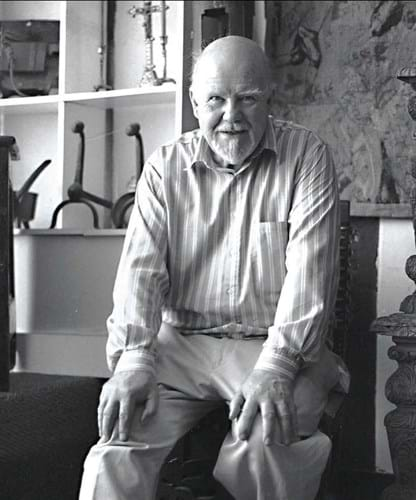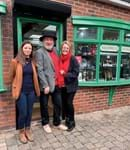Born into a naval family in Portsmouth, Keith did not meet his father – away at sea, until he was two years old. He remained in Portsmouth throughout the Second World War and told hair-raising stories of collecting shrapnel while the bombing raids continued.
At the age of 12 he contracted tuberculosis and spent the next five years in hospital. Fortunately, he was cured by the arrival of the drug, streptomycin. Fully cured, Keith pursued various careers, including boat building, accountancy, printing and working as a theatre call boy. It was the last of these that began a career backstage in the props department of Sadlers Wells.
Antiques career begins
In 1960, Keith married Alison and it became a time to settle down. He found that he had a great interest in antiques and managed to get a job with Christopher Sykes at Dunnings Antiques in St Albans where many well-known dealers started their careers.
It was not long before Keith’s huge talent for selling became obvious and he was soon Dunnings’ best salesman, also leading selling at their large stand at the Chelsea fair.
In 1966, Keith decided to start his own business, Phoenix Antiques, and moved to a small shop in Fordham, near Cambridge.
This lasted for a short time and, as the business expanded, he moved to a much larger shop at 1 Carter Street where he continued to specialise in early English and Continental oak and related items. With his various talents, especially for display and salesmanship, the shop soon became very successful, attracting trade and private customers, along with many Americans from the two local airbases.
New adventures
Keith was always game for new adventures. In 1969, he took a stand at a fair in New York, organised from England, and nearly sold out.
Then, after staying with friends in Holland he was taken to a fair at the Keukenhof (of tulip fame), near Amsterdam, liked the event, contacted the organisers and found that not only was there a stand available but that they were keen for him to exhibit. Would I like to share his stand? “Why not,” I replied.
The first fair was almost a disaster. The shippers we used lost our container somewhere in Amsterdam docks. When it did not materialise, we set off with Harry, son of Keith’s friend, as interpreter and eventually tracked it down. It arrived at the fair just in time for us to throw stock onto the stand, whereupon we sold nearly all of it.
So began a period of hard work but with good rewards and Keith was in his element, making new friends and contacts.
We never used a shipper again. Keith produced a large 18ft trailer, which we drove over ourselves, in itself a source of many Bycroft stories. One day we were waiting to board with our ‘rig’ when a customs officer came over, looked at it in disbelief and said, “I’m quite sure there is something illegal about that but I haven’t got time to find out what” and waved us through.
Buying trips
With the shop and fairs going well, stock was needed to replace the sold items and I accompanied Keith on many buying trips, when he could always be relied on to find the best and most reasonable place to eat or stay.
On the long drives he was, to quote his daughter, “a teller of stories and jokes, a weaver of tales and raconteur of long-remembered anecdotes”.
The buying trips were later extended to Spain and sometimes France, creating even more chances of anecdotes.
Keith’s luck continued to hold and on one occasion, after our load had been packed, he bought four large frames and four antique pistols. The frames he said lightly could go as hand luggage on the plane “and I’ll put the guns in my suitcase” he said. I replied: “The frames are far too big for hand luggage and I expect the pistols will get us arrested.”
Keith took no notice and struggled onto the plane with his frames to be met by the stewardess. “Good morning, sir,” she said, brightly, ‘give me those,’ and off she went and found three empty seats which just about accommodated the frames. Keith looked smug. I said: “You still have the pistols in your case…” Of course, nothing happened and the pistols sailed through customs with no trouble at all.
Sadly, in later years, I moved away to the West Country, but we kept in touch and he and Alison came to stay several times.
More recently, my wife and I were extremely lucky to be able to have lunch with Keith and his daughter, Frances. This was about six weeks before he died. It was a beautiful day and we had lunch in the garden at the old marble table, which I remember from 40 years ago. Keith was on great form, drinking copious quantities of red wine and remembering about the old days.
We were so pleased to have this last very happy memory of him.
Michael Todd













